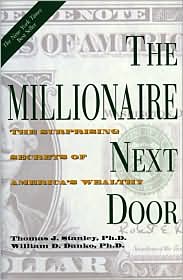Over the Christmas holidays, I finally sat down and read The Millionaire Next Door by Thomas Stanley, Ph.D. and William Danko, Ph.D. If you’re old enough, you’ll remember this book was EVERYWHERE back in the late 1990’s. I dutifully bought a copy and it has sat on my bedroom bookshelf ever since.
For whatever reason, December 2009 seemed like the time to finally read it. I don’t quite know what I expected, but I’m sure I thought it would be more entertaining to read than it actually turned out to be. However, the information was terrific (even if presented in an amazingly dull fashion) and I kept reading until I finished --and I’ve thought about much of that information every day since. So, a worthwhile book, if you can drag yourself through it.
A quote in the introduction pretty much sums up the book’s message:
“Wealth is not the same as income. If you make a good income each year and spend it all, you are not getting wealthier. You are just living high. Wealth is what you accumulate, not what you spend.”
When we imagine the wealthy in the United States, we tend to think of movie stars or CEO’s of major corporations. These people do obviously exist and they are certainly rich, but it turns out that MOST millionaires in the USA are pretty average people, with pretty average jobs. In fact, you probably know a few millionaires, but have no idea they have the kind of money they do.
According the Drs. Stanley and Danko, the vast majority of millionaires don’t live in exclusive neighborhoods, don’t drive expensive cars or send their children to private schools. In fact, most people who are spending their money on these kinds of things, are living paycheck to paycheck – but trying to fool everyone (including themselves) into thinking that they are rich. Truly wealthy people usually live way below their income level (as much as 30 – 50% below) and invest their money. And they've lived like this for decades, especially when their income was very low in their younger years -- and it made them wealthy.
Can you imagine living on half of your current income? Would it kill you? Probably not. However, most of us (without having to actually tell anyone) want people to KNOW how much we make. Actually, most of us want others to think we make MUCH MORE than we really do. So we buy things: clothes, cars, purses, houses, 2nd homes, shoes, electronics, phones, CDs, furniture, dinner out, and vacations to exotic places like we are Paris Hilton or one of Bill Gates’ children (no relation J). And we fritter away our current income and our wealthy financial future -- all for pride.
In the coming weeks, I’m going to share some ideas for living WAY BELOW your income level. It’s one of your most important steps to becoming very wealthy.


4 comments:
My husband and I have a hard time understanding the benefit of suffering now to be wealthy when we are 80. What is the use? We probably need to readjust our attitude, but I need valid reasons.
Right now, living on less would be extremely difficult, but there have been times when I could have easily lived on half of our income. Actually, we did when I quit my job. :)
Tara, a very valid comment. There is a point in your finances that is called "Cross Over" (a good book to read about it is Your Money or Your Life). Reaching Cross Over means that you are earning enough interest on your investments to cover all your monthly expenses. At that point you don't HAVE TO WORK if you don't want to. Most people by being very frugal can hit that mark in less 10 years.
Read the book. It will revolutionize your life.
I read that book for a personal finance class and it totally changed my perspective on the wealthy. The facts were interesting and really made money goals a future possible reality. Thanks for all the wonderful tips! I read the book (Financial Peace) that you gave us as a gift for our wedding and I love the tips in there too. Very wise and gets us thinking right from the start of our marriage. Thanks! - Chelsea Bishop
Post a Comment